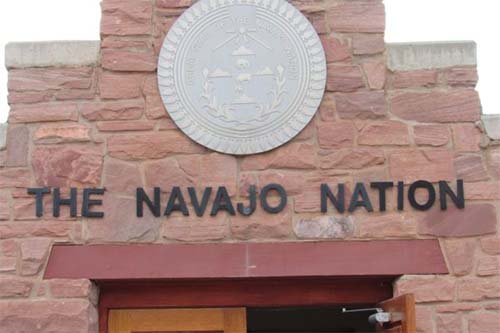
- Details
- By Native News Online Staff
Navajo Nation President Buu Nygren asked the Window Rock District Court on Monday to block legislation that seeks to remove him and Vice President Richelle Montoya from office for alleged malfeasance, misfeasance and breaches of fiduciary trust duties under Navajo Nation law.
In the filing, Nygren’s legal team raised several arguments mirroring those used by attorneys for former President Joe Shirley Jr. when he was placed on emergency administrative leave more than a decade ago.
Navajo Nation Council Speaker Crystalyne Curley defended the legislation, known as 0263-25, saying the Council is acting within its authority and responding to findings made by the special prosecutor.
“The Council is the voice for the Navajo people. An independent investigation conducted by the special prosecutor has led to multiple findings of violations of our laws that have now been filed in court. President Nygren is not above the law and needs to be held accountable,” Curley said. “The Nygren/Montoya Administration has lost the trust of the Navajo people. Their administration has been nothing short of an embarrassment for our Navajo people and our government.”
The Office of Legislative Counsel also rejected Nygren’s contention that the bill represents an “illegal power grab,” calling the claim “false, misleading, and [one that] ignores the clear authority granted to the Council under Navajo Nation law.”
Under the legislation, Nygren and Montoya would be permitted to address the removal effort before the Naabik’íyáti Committee and again before the full Navajo Nation Council. The process follows 11 N.N.C. § 240(A), which governs removal proceedings.
The filing cites Shirley v. Morgan but does not note that the decision did not invalidate 11 N.N.C. § 240(A). The Navajo Nation Supreme Court has never struck down the Nation’s removal statute, and it remains in effect, according to legislative attorneys.
The Council emphasized that the Navajo Nation government operates under a three-branch system and that no branch — including the Executive — can supersede the laws enacted by the Nation and its representatives.
“The Navajo Nation Council remains committed to upholding transparency, protecting checks and balances, ensuring due process for all officials, defending the Nation’s laws, institutions, and dignity, and representing the call of the Navajo people asking Council to remove the President and Vice President,” Curley said.
The Council said it will continue forward “in a manner that respects Diné Bii Beehazanii, the Navajo Nation Code, and the voice of the Navajo people.”
More Stories Like This
50 Years of Self-Determination: How a Landmark Act Empowered Tribal Sovereignty and Transformed Federal-Tribal RelationsAlcatraz Sunrise Gathering Marks 50 Years of Indigenous Activism
Navajo Nation Vice President Distances Herself From President After Removal Resolution
Navajo Council Speaker Introduces Legislation to Remove Navajo Nation President, Vice President Amid Ethics Complaint
Help us tell the stories that could save Native languages and food traditions
At a critical moment for Indian Country, Native News Online is embarking on our most ambitious reporting project yet: "Cultivating Culture," a three-year investigation into two forces shaping Native community survival—food sovereignty and language revitalization.
The devastating impact of COVID-19 accelerated the loss of Native elders and with them, irreplaceable cultural knowledge. Yet across tribal communities, innovative leaders are fighting back, reclaiming traditional food systems and breathing new life into Native languages. These aren't just cultural preservation efforts—they're powerful pathways to community health, healing, and resilience.
Our dedicated reporting team will spend three years documenting these stories through on-the-ground reporting in 18 tribal communities, producing over 200 in-depth stories, 18 podcast episodes, and multimedia content that amplifies Indigenous voices. We'll show policymakers, funders, and allies how cultural restoration directly impacts physical and mental wellness while celebrating successful models of sovereignty and self-determination.
This isn't corporate media parachuting into Indian Country for a quick story. This is sustained, relationship-based journalism by Native reporters who understand these communities. It's "Warrior Journalism"—fearless reporting that serves the 5.5 million readers who depend on us for news that mainstream media often ignores.
We need your help right now. While we've secured partial funding, we're still $450,000 short of our three-year budget. Our immediate goal is $25,000 this month to keep this critical work moving forward—funding reporter salaries, travel to remote communities, photography, and the deep reporting these stories deserve.
Every dollar directly supports Indigenous journalists telling Indigenous stories. Whether it's $5 or $50, your contribution ensures these vital narratives of resilience, innovation, and hope don't disappear into silence.
 The stakes couldn't be higher. Native languages are being lost at an alarming rate. Food insecurity plagues many tribal communities. But solutions are emerging, and these stories need to be told.
The stakes couldn't be higher. Native languages are being lost at an alarming rate. Food insecurity plagues many tribal communities. But solutions are emerging, and these stories need to be told.
Support independent Native journalism. Fund the stories that matter.
Levi Rickert (Potawatomi), Editor & Publisher

